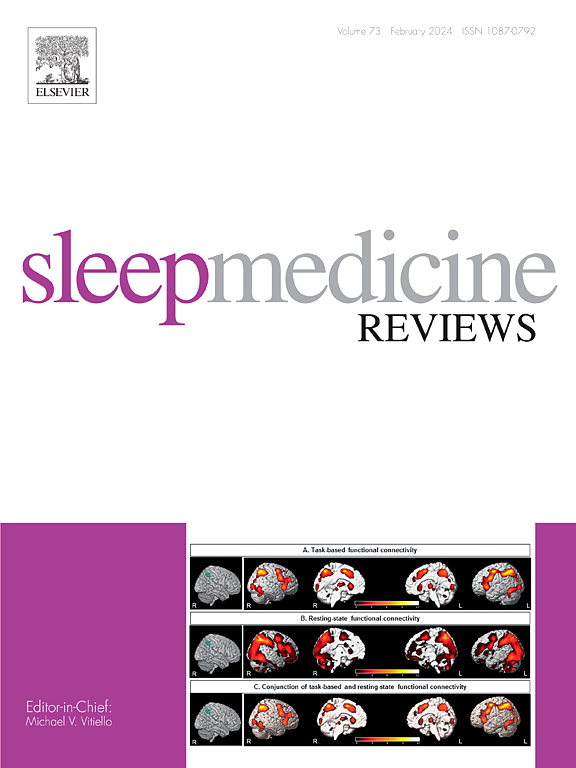食用左旋茶氨酸对睡眠结果的影响:系统回顾与荟萃分析
IF 9.7
1区 医学
Q1 CLINICAL NEUROLOGY
引用次数: 0
摘要
这项系统综述和荟萃分析旨在评估茶氨酸对睡眠结果的影响,茶氨酸是茶中发现的一种非蛋白质氨基酸。文献检索是在五个电子数据库(APA PsycINFO, CINAHL, Medline, Scopus, Web of Science)和一个注册(Cochrane Central register of Controlled Trials)中进行的,从成立到2024年9月。随机对照试验调查了l -茶氨酸补充剂对所有年龄和健康状况的人类睡眠质量的影响。选取了19篇文章(N = 897名参与者),其中18篇纳入meta分析。l -茶氨酸显著改善主观睡眠发作潜伏期(SMD = 0.15, 95% CI [0.01, 0.29], p = 0.04;n = 10项研究),主观日间功能障碍(SMD = 0.33, 95% CI [0.16, 0.49], p <;0.001;n = 9项研究)和总体主观睡眠质量评分(SMD = 0.43, 95% CI [0.04, 0.83], p = 0.03;N = 12项研究)。研究结果表明,l -茶氨酸在治疗睡眠障碍方面具有潜在的作用;然而,缺乏关于“纯”l -茶氨酸的研究值得进一步调查。未来的研究需要确定l -茶氨酸补充的适当剂量和持续时间,以改善和维持健康和临床人群的睡眠质量。本文章由计算机程序翻译,如有差异,请以英文原文为准。
The effects of L-theanine consumption on sleep outcomes: A systematic review and meta-analysis
This systematic review ansd meta-analysis aimed to evaluate the effects of L-theanine, a non-proteinogenic amino acid found in tea, on sleep outcomes. Literature searches were conducted in five electronic databases (APA PsycINFO, CINAHL, Medline, Scopus, Web of Science), and one register (Cochrane Central Register of Controlled Trials) from inception until September 2024. Randomised controlled trials investigating the effects of L-theanine supplementation on sleep quality in humans of all ages and health status were included. Nineteen articles (N = 897 participants) were selected and 18 included in the meta-analysis. L-theanine was shown to significantly improve subjective sleep onset latency (SMD = 0.15, 95 % CI [0.01, 0.29], p = 0.04; n = 10 studies), subjective daytime dysfunction (SMD = 0.33, 95 % CI [0.16, 0.49], p < 0.001; n = 9 studies), and overall subjective sleep quality score (SMD = 0.43, 95 % CI [0.04, 0.83], p = 0.03; n = 12 studies). The findings indicate the potential use of L-theanine in the management of sleep disturbances; however, the lack of studies on “pure” L-theanine warrants further investigation. Future studies are needed to determine the adequate dose and duration of L-theanine supplementation for improving and maintaining sleep quality in healthy and clinical populations.
求助全文
通过发布文献求助,成功后即可免费获取论文全文。
去求助
来源期刊

Sleep Medicine Reviews
医学-临床神经学
CiteScore
20.10
自引率
3.80%
发文量
107
期刊介绍:
Sleep Medicine Reviews offers global coverage of sleep disorders, exploring their origins, diagnosis, treatment, and implications for related conditions at both individual and public health levels.
Articles comprehensively review clinical information from peer-reviewed journals across various disciplines in sleep medicine, encompassing pulmonology, psychiatry, psychology, physiology, otolaryngology, pediatrics, geriatrics, cardiology, dentistry, nursing, neurology, and general medicine.
The journal features narrative reviews, systematic reviews, and editorials addressing areas of controversy, debate, and future research within the field.
 求助内容:
求助内容: 应助结果提醒方式:
应助结果提醒方式:


